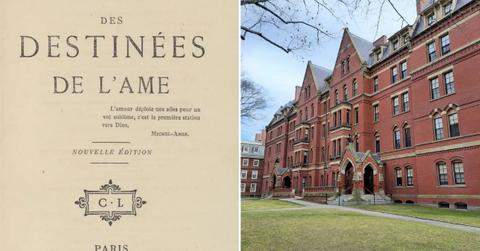Uncovering Controversy: Harvard University Removes 19th-Century Book Bound with Human Skin From Library

Harvard University announced it removed a binding made of the skin of a deceased woman from the 19th-century book "Des Destinées de l'Ame," which they house in their library.
Harvard University has made a significant decision regarding a unique book in its library collection, "Des Destinées de l’Ame," dating back to the 19th century.
This book, penned by French novelist Arsène Houssay, meaning "Destinies of the Soul," had a binding made from human skin, sourced without the individual's consent.
The original binder, Dr. Ludovic Bouland, a French physician, utilized the skin of an unidentified deceased patient.
In a recent announcement, Harvard University declared the removal of this macabre binding, citing ethical concerns surrounding its origins and subsequent history.
The university emphasized that such human remains are no longer deemed suitable for inclusion in their library collections. This decision marks a departure from the previous availability of the book, which was accessible to interested parties upon request.
The university is now engaged in comprehensive research into the provenance of the book, Dr. Bouland and the anonymous female patient.
- What Lies Beneath: NASA Scientist Believes Aliens May Have Found 'Perfect' Hiding Spot in Earth's Oceans
- Global Threat: Russia Insider Warns West of 'World War Using Nuclear Weapons' Amid Escalating Support for Ukraine
- Countdown to Disaster? Ex-NATO Official Warns Russia, Iran and China Could Wage WWIII in Just Years
Additionally, consultations with relevant authorities in both the university and France are underway to determine an appropriate and respectful disposition for the human remains.
Anecdotes suggest that in the past, students tasked with retrieving materials from the library stacks may have been unaware of the book's unique composition, leading to potential hazing situations.
Never miss a story — sign up for the Front Page Detectives newsletter. Be on the scene the moment news breaks.
Tom Hyry, an archivist at Harvard's Houghton Library, characterized the decision regarding the book as an "unusual circumstance." He emphasized the inherent disrespect in the original act of binding the book with human skin, stressing the need for the remains to be laid to rest respectfully.
Previously, Harvard's response to the confirmation of the book's anthropodermic binding in 2014 was characterized by a more lighthearted tone, which they have since acknowledged as inappropriate.
They expressed regret for the past use of sensationalistic language and humor, recognizing the need to uphold the dignity of the individual whose remains were used in the book's creation.
Become a Front Page Detective
Sign up to receive breaking
Front Page Detectives
news and exclusive investigations.
